Arriving home on crutches on 8 October, she had a mixed reception – roses from staff at the hotel in Jordan, she was held up by Metropolitan Police on suspicion of supporting a terrorist organisation, before being welcomed with friends holding banners surrounded by police at arrivals in Heathrow, before being cheered on by TfL staff.
This was Hannah’s experience of her six-week trip on the Global Sumud Flotilla’s mission to break the aid blockade to Gaza – a mix of incredible support and extreme hostility.
The hostility came at night in the form of the Israeli navy – having already endured drone attacks and a grenade dropped on some of the 42 boats flotilla boats carrying politicians, journalists, lawyers and 22-year-old Swedish activist Greta Thunberg, Hannah's crew were ready – soldiers boarded, guns pointed at their chests as cameras and their Starlink navigation system were “smashed to pieces”.
Hannah, at 62, was the only known person from Wales on the largest flotilla in history to attempt to break the aid blockade to Gaza.
She signed up “just to do something constructive” - with years of experience as a sailing instructor with Cardigan Bay Water Sports, she brought her steady hand to the boat as it was rocked by Israeli ships trying to stop them as they neared Gaza.
She sent a WhatsApp message to a group chat three hours before they were seized, in the early hours of 2 October: “They tried to bounce us into submission with their wake. I do it all the time to the kids at work when there's no wind, so obvs just laughed.”
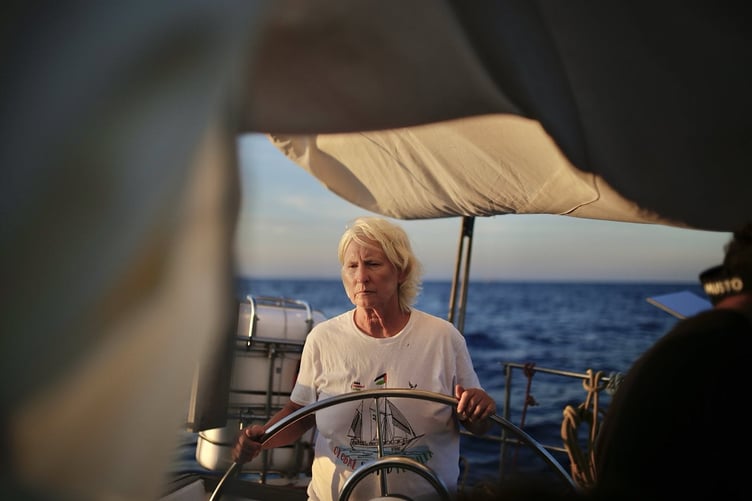
But this was no dolphin spotting trip – 10 flotilla volunteers attempting to bring aid to Gaza were killed by Israeli forces in 2010, sparking global outrage.
Israel has enforced a naval blockade on Gaza since 2009, which it states is necessary to prevent weapons from being smuggled in, heavily controlling its borders, free movement and entry of food, goods and aid since 2007 when Hamas took control.
Convoys have attempted to break this blockade since 2010, with efforts stepping up since the aid blockade worsened following the Hamas attack on Israel on 7 October, 2023.
Speaking to the Cambrian News two days before she was seized at gunpoint, Hannah said: “If I die, I won’t regret coming.
“Sometimes you’ve just got to do your best to help.”
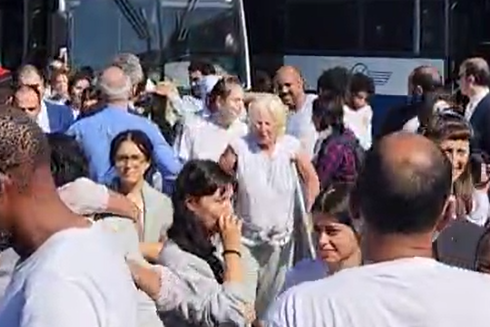
From all reports, no one died after being taken by Israeli forces from the Sumud flotilla, though six of the 479 were still being detained as of 7 October.
However, there are consistent reports from the volunteers and their legal aid, human rights organisation Adalah, of physical and verbal abuse and breaches of their human rights.
Some were forced to watch footage of the 2023 Hamas attack, which played on repeat outside their cell.
Hannah physically suffered from having no access to clean water – forced to drink tap water from the cell, she developed a stomach illness that stopped her from eating.
Her knee injury was her own doing, and was given crutches after they’d been taken to Israel’s Ashdod port.
She witnessed hijab’s being “ripped off” the heads of female volunteers, stating “anyone who was brown or black received a lot worse treatment than those who were white... the way the guards reacted to you depended on what you looked like”.
Ketziot prison - Negev desert
After being taken against their will in international waters, the flotilla volunteers were driven for hours to the notorious Ketziot prison without being told where they were headed.
At this point, the UK Foreign Office expressed ”extreme concern” for their safety.
Israeli human rights group B’Tselem last year shared a report with testimonies of Palestinians taken to Ketziot since October 2023, describing beatings, humiliation, torture, sexual violence and a denial of sanitation and food.
Hannah reports not being given any food the first day, then receiving a slice of white bread and processed cheese, “which I wouldn’t entertain eating at home, but it did taste good because we’d had no food”.
She remembers being outside in the sun to wait for hours in a holding pen three by four meters squared, holding 57 women who were shouting for medical aid for a woman who had taken ill – the group had been threatened to be “gassed” by a guard: “It was brutal.”
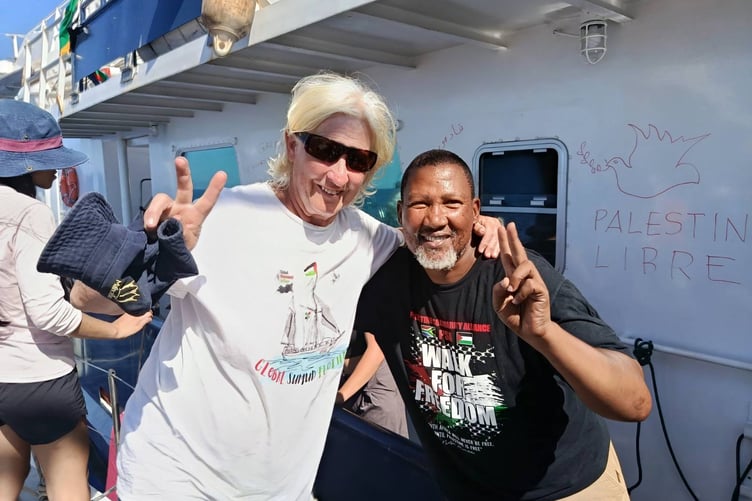
They were waiting to see a detention judge, who told them that “we didn’t need” legal representation.
She shared a cell with around 15 people, with 12 mattresses between them.
The cell faced a banner showing a picture of Gaza as a “bomb site” with the words “The New Gaza” written in Arabic across it and the Israeli flag underneath: “It was just sick.
“It was a good illustration of their mentality; they were proud of the mess they’d made of Gaza and the people they’d killed.
“I think it’s important to remember that prison is usually full of Palestinians.
“You could tell the guards were on their best behaviour with us, really I can’t complain about anything that happened to me.
“I felt weirdly sorry for [the Israeli guards], it must not be very nice to be that hardened to life.
“The guards weren’t as full of joy - but we were.”
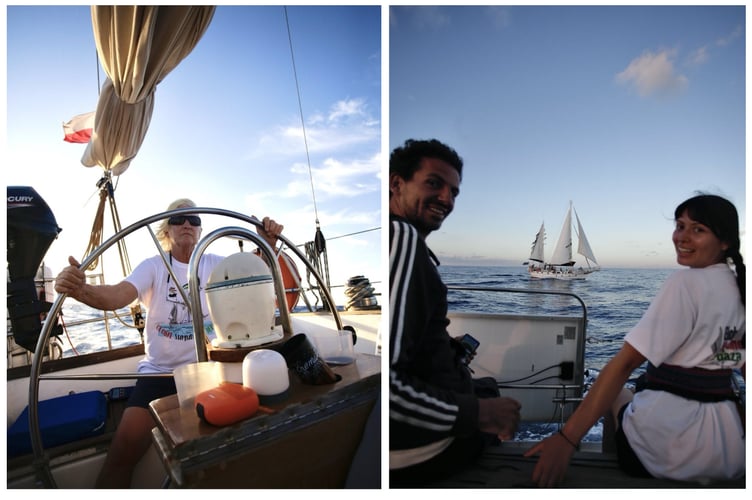
Despite the “brutality” coming from the guards who forced them to strip, threw away their jewellery and valuables and cut up their belongings, Hannah said: “There were almost 150 women who were all strong activist women.
“The spirit amongst us outweighed any brutality that the guards could throw at us by quite a big way.
“For me, it was a real privilege to get to know these women.
“All we could do was talk, so we did.
“It takes a certain type of person to do this.
“Though we were all really different from different places and backgrounds, we had this real spirit in common.”
The Sumud Flotilla had people from an estimated 44 different countries.
Growing up in a family of Quakers, Hannah was instilled with a “strong belief in social responsibility and justice”.
Coming of age in the late 70s in Toxteth, Liverpool, just as Margaret Thatcher came to power, Hannah “grew up with the people suffering the consequences of racism and oppression”.
She went from CND Youth Camp to the Greenham Common Peace Camp, spending a year there, being involved in actions that put her in court.
Becoming a South African anti-apartheid campaigner, she and her friend Shiela Sen hit newspapers in 1985 at 21-years-old for forcing South African-born Zola Budd to stop competing in a Commonwealth Games qualifier – both were fined £75.
Now friends for over 40 years, Shiela, 65, said: “She’s a real hero of mine.
“She takes great pleasure from turning people onto a sport, teaching young people to sail.
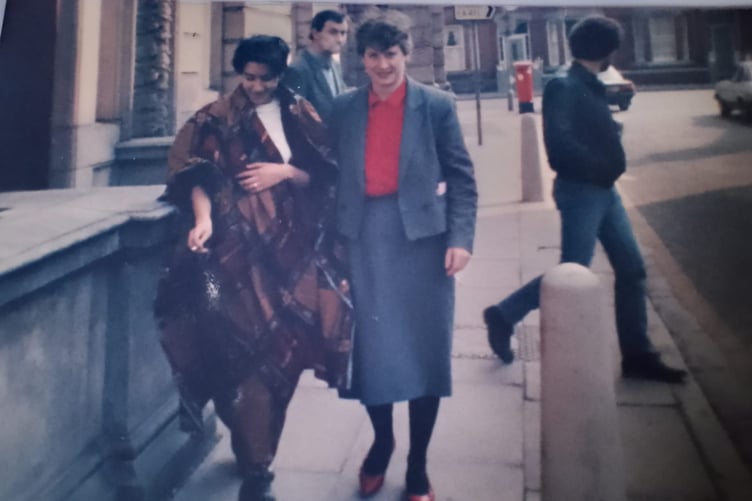
“She’s got an enormous social conscience.
“She helps her neighbours fix things, not for money, she’s a community giver.
“She’s not afraid of some discomfort.”
Only last year, Hannah was given an RYA Cymru Wales Impact Award for empowering women to sail.
Marie Lewis, a friend from New Quay, said: “One outstanding memory of this commitment is when the Covid pandemic broke out, at a time when people were hiding from the neighbours and suspicious of other humans, Hannah chose to take a job in the local hospital to help with the impact of the pandemic.”

In the five days of no contact from Hannah whilst she was detained, her friends and family stepped in to advocate on her behalf.
Her sister Siobhan Schafer made contact from the west coast of America with Hannah’s MP, Ben Lake, who worked with other MPs to lobby for the safe return of the UK citizens who were part of the flotilla.
Writing to the Foreign Secretary, he “implored” Yvette Cooper to “make representations to your Israeli counterparts regarding this flagrant breach of international law”.
The Foreign Office were in touch with Israeli authorities to resolve the situation “safely, with due respect for the rights of all those on board, and in line with International Law”.
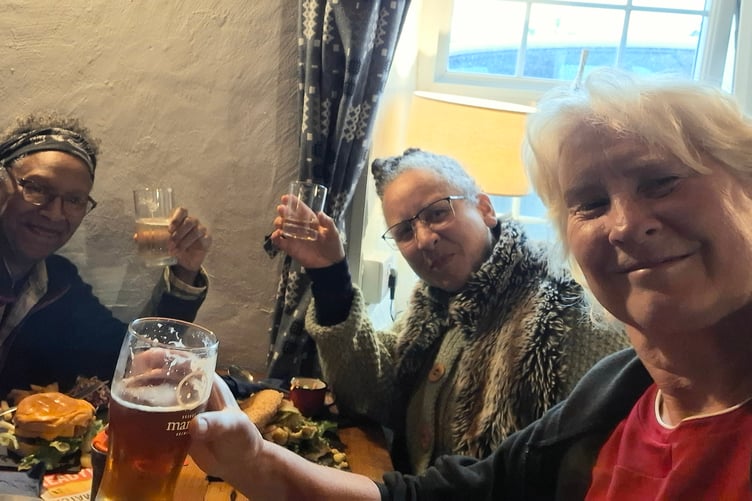
A spokesperson added: "No one would be trying to deliver aid directly via this route if the Israeli government had not placed completely unacceptable restrictions on the flow of aid, creating a humanitarian catastrophe in Gaza.
"It is the responsibility of the Israeli government to immediately and unconditionally lift restrictions on aid so that the UN and NGOs can deliver food, medicine and other essentials to civilians in desperate need.
"That requires the opening of land routes so that aid can be delivered into Gaza through safe and established channels, at the pace and volume that is required to meet the scale of this humanitarian crisis.”
Major humanitarian groups, including Oxfam and Médecins Sans Frontières (MSF), state they have been blocked from delivering a single truck of aid to Palestinians since 2 March this year.
“Relieved but disappointed”
In the early hours of 2 October, Hannah’s 48-foot sailing boat, the Hio, which sailed with nine other volunteers, was only 70nm from Gaza (130km).
Boarded by Israeli soldiers at 1am after enduring water cannons and hours of being circled by gun ships, she described the “relief” after over a day of anticipating an Israeli interception, but also “disappointment”: “The whole trip, I believed we were going to get to Gaza with our aid and be able to unload it and give it to the people of Gaza.
“It was a symbolic amount but it would've still been so beautiful to have got there.
“Even though we didn’t succeed in breaking the siege, we’ve got more people talking about it.
“A lot of people are led to believe there’s nothing you can do as an ordinary person – they feel desperate and depressed and hide their heads in the sand because they feel such despair at the state of the world and not being able to do anything about it.
“I hope to help inspire people to feel like there is something they can do.
“None of us is powerless.
“I don’t mean everyone can get up and sail a boat across the Mediterranean to Gaza, but there were a lot of people supporting us from home as well.
“The people in Italy rose up and forced the Italian government to get their citizens home swiftly.
“People everywhere can make a difference.
“You just need to work out what you can do and then do it.”
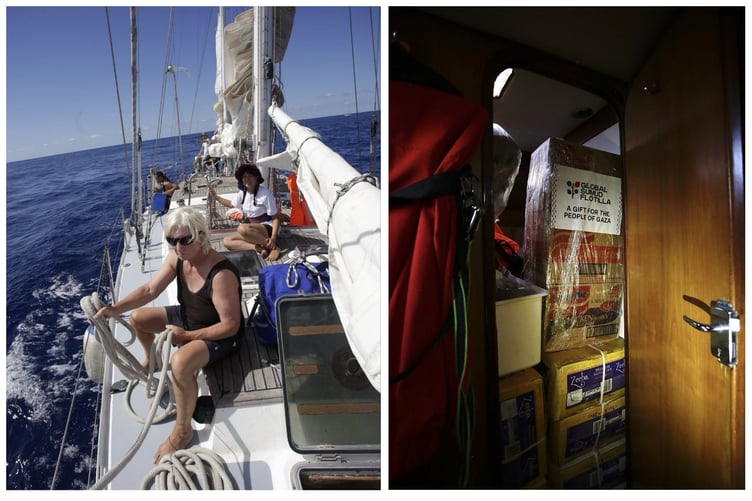
On 2 October, two million people took part in an Italy-wide strike after Israel’s interception of the Sumud flotilla, as part of worldwide protests against Israel’s illegal interception in international waters.
Italian citizens were released from prison the same day.
Despite the six week ordeal – having set off from her home in New Quay on 24 August to join the flotilla from their starting point in Barcelona – Hannah said “she’d be very surprised” if this was her last bout of activism: “I’ve had my struggles over the years, I’ve lived through pain same as everyone, but I’ve also had quite a nice life in many ways.
“I’m happy to dedicate what's left of my life to try and encourage people to take the path of humanity, not the path of horror.”
Israel’s Foreign Ministry denied all claims of mistreatment, stating that all the volunteers were “safe and well” whilst in their care, before describing the flotilla as a “Hamas-Sumud provocation” and a “sham”.
The Israeli government has not provided any evidence of connections between the flotilla and Hamas.
A spokesperson for the Metropolitan Police said: “A group of four people were spoken to by officers at Heathrow Airport on 8 October.
“They were not arrested or detained under any police powers and all four carried on their way with no further action.”
As a peace deal is tentatively reached between Israel and Hamas, the future of aid to Gaza remains unclear.
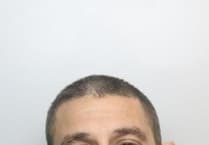
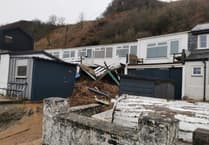
.jpeg?width=209&height=140&crop=209:145,smart&quality=75)
.jpeg?width=209&height=140&crop=209:145,smart&quality=75)
Comments
This article has no comments yet. Be the first to leave a comment.